All images courtesy of Artist except Stray Kids (Jun Sato/WireImage via GettyImages) and Twice (JYP Entertainment).
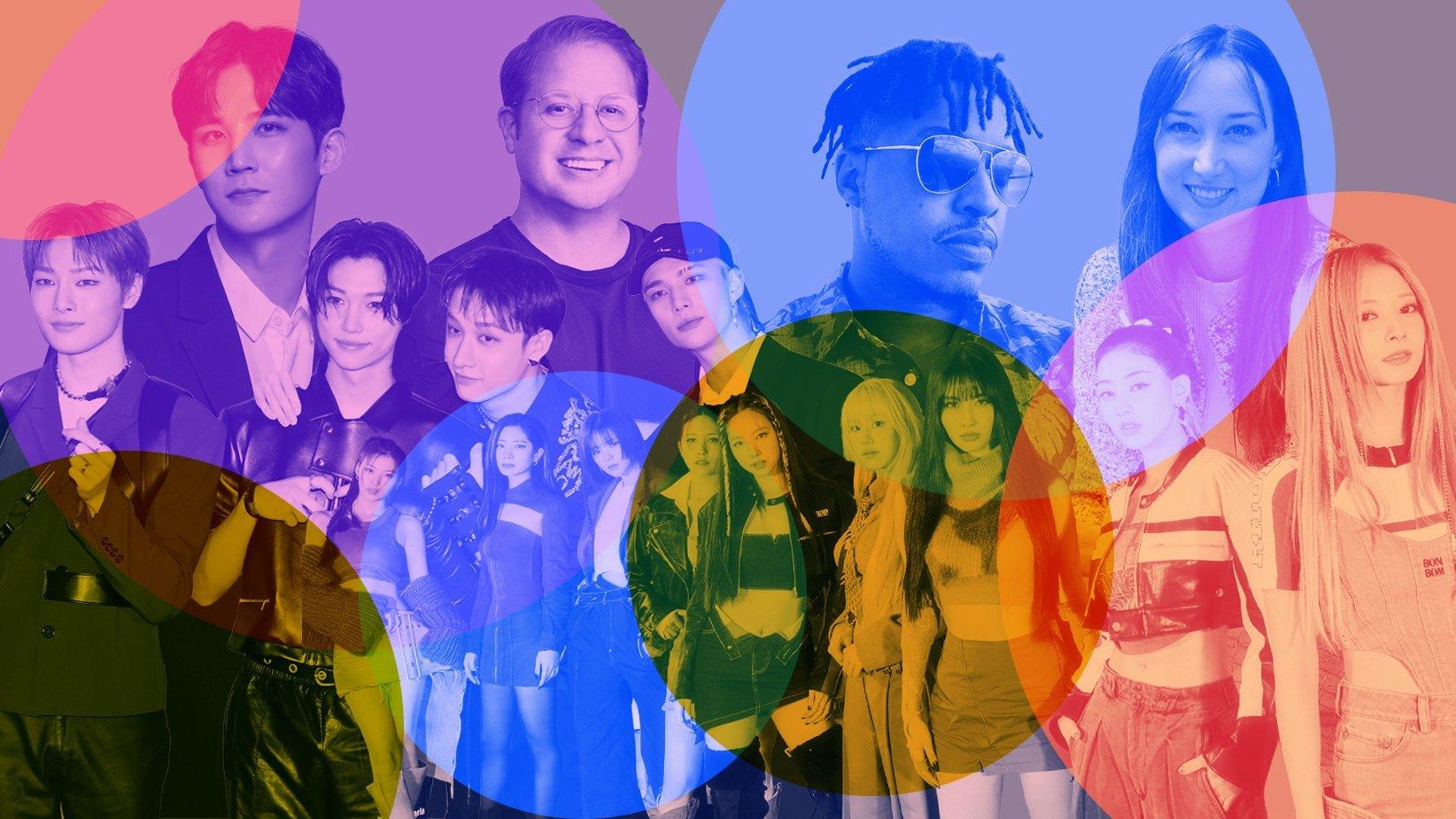
feature
What's Next For K-Pop? A Roundtable Unpacks The Genre's Past, Present And Future
K-pop evolves each year, but what makes it so enticing? And what awaits in the future? GRAMMY.com invited industry leaders, and members of TWICE and Stray Kids, to discuss K-pop's current state, biggest misconceptions, and celebrate its magic.
K-pop recently entered its third decade since pioneers Seo Taiji and Boys upheaved South Korea with 1992’s nonconforming "Nan Arayo" — considered by many the inception of the industry. Propelled by the Hallyu (or Korean Wave, the phenomenon driving international growth and popularity to the country’s cultural exports), K-pop has evolved from a niche genre to a global scene whose influence is felt in music, fashion, business, tech, and many other fields.
Characterized by a strong visual focus, musical innovation that can include anything from reggae to EDM influences in a single song, knife-sharp choreographies, and devoted fandoms, K-pop’s reach outside of South Korea is nothing short of outstanding — if not expected. While mostly known for multi-member boy and girl groups (some with upwards to 10 singers), there are also plenty of soloists, duos, trios, and a few co-ed ensembles, ensuring that even the pickiest music listener can find something to enjoy.
Its idols — as K-pop artists are called — are inspirational, often skilled in singing, dancing, rapping, songwriting, and producing after years of arduous training. Many are fashion ambassadors to high fashion brands (such as BTS’ Jimin for Dior), and several have ventured into acting, modeling, and designing their own collections. Idols remain in touch with global fans through tours, fan meetings, virtual fancalls and social media, including K-pop-specific paid apps, like HYBE’s Weverse and DearU’s Bubble, where they can send direct messages to fans detailing their routines and heartfelt thoughts.
All those factors contribute to the worldwide growth of K-pop. According to the International Federation of the Phonographic Industry, eight of the top 10 global album sales in 2022 were by K-pop acts, including BTS, Stray Kids, and ENHYPEN. For the first quarter of 2023, Billboard reported that stocks from K-pop's largest companies — HYBE, SM Entertainment, YG Entertainment, and JYP Entertainment — have risen an average of 75.1 percent year to date, surpassing both Universal Music Group and Warner Music Group, which each presented a decline.
Ten years after PSY’s 2012 mania "Gangnam Style," K-pop has risen to the upper echelons of the music industry. A BTS music video nominated for A GRAMMY Award (last year’s "Yet to Come"); Fifty Fifty’s viral hit "Cupid" can be heard on the radio; BLACKPINK headlined Coachella and TWICE sold out Los Angeles' SoFI Stadium. Each a feat that seemed impossible not too long ago.
Moving at breakneck speed, K-pop continues to present a new evolution of itself within each year. But what makes it so enticing? And what awaits in the future? GRAMMY.com invited several leaders and luminaries of the industry to discuss its current state, demystify some of its biggest misconceptions, and celebrate its magic.
Quotes from these interviews have been edited for brevity and clarity.
What do you think are the key elements to make a K-pop hit? Have these elements changed throughout the years?
Vince (singer/songwriter/producer under THEBLACKLABEL, an associate company to YG Entertainment): Being a Korean American living in Korea gave me cultural influences that are unique and diverse. With so many creatives from different backgrounds just like mine, I think we’ve been able to make songs that blend all those influences and resonate with not only the Korean audience, but the global audience too. Also, our emphasis on making the right visuals to provide a wholesome experience was a major key to success. I think this approach hasn’t changed and we will continue to do that moving forward.
Marion Van der wees (manager/A&R consultant at VDW Music Group, who placed songs for BTS, TXT, and more): Honestly, nowadays, nobody knows what a hit is. Lots of songs have gone viral in the most surprising ways. Fifty Fifty, who recently debuted, is now topping the global charts with their song "Cupid." However, the ideal recipe for a great K-pop song would be a catchy hook/chorus — which is usually in English so more people can sing it — and a danceable song that can bring on a choreography that is infectious enough so people want to learn them and make TikToks.
Nayeon (singer/songwriter, TWICE member): First, I think we were lucky enough to have amazing songs. "Luck" plays an important role when making a hit. Also, there has to be a concept, choreography, and additional content to support it. I don’t think these factors change with time drastically, but rather our attitudes and minds tend to change.
Adrian McKinnon (songwriter, producer): I think it's important to love what you're working on, period. In any career, there comes a point when a person can just phone in an idea, a letter, a proposal, etc. You may be able to get away with that once or twice, but if you get used to operating in that manner, don't be surprised if you get fewer and fewer calls over time. When you love what you do, you grow. When you float along half-assing your work, you're stagnant.
Wonderkid (songwriter/producer under BELIFT LAB, a label founded by CJ ENM and HYBE responsible for boy group ENHYPEN): It is difficult to make a public appeal solely through the power that a track holds. When the concept and plan go hand in hand with the track, it creates a synergistic effect.
There are definitely certain trends during certain periods, but it’s mostly a façade. At the core of high quality music (or art) in any era lies in the essence of "beauty." I think artists should always be humble when it comes to the beauty of art, which is the only definite signpost that connects the past, present, and future.
Changbin (singer/songwriter, Stray Kids member): I think that keeping our style consistent while venturing into diverse sounds is part of what allows people to listen to our music. At first it was difficult because our color is very strong, but now we have a solid idea as to what direction we have to go in. [Editor's note: "Colors" are often used in reference to a group's charms, musical identity and appeal.]
HAN (singer/songwriter, Stray Kids member): Trends change very quickly these days, so while I do believe that there are certain sounds that are trending, I don’t necessarily believe that trends are what make a good song. The fact that Stray Kids’ music is always consistent is the reason why listeners are interested in us. A successful song should contain something familiar yet fresh.
Felix (singer/songwriter, Stray Kids member): I don’t believe we’ve found the key elements to make a K-pop hit yet, but we do have our own way of making our own music. We understand and can express our colors well.
Although K-pop reached unimaginable heights since its origins, it's still an industry that is often misunderstood. Why do you think it's so hard for people to appreciate the true value of K-pop?
Vince: I think idols get misunderstood because they have to present themselves in the media in a lot more diverse ways than a conventional artist would. Most of them are people that have been training to do music for years and are just like any other artist who go through the process of making music. A lot of times, for me, it was a cooperative effort in the studio with artists — just like with any other writer and producer.
Shin Cho (Head of K-pop at Warner Music Asia): I simply see it as stereotypes, misunderstandings, and preferences from people who come from a different background. This occurs in many industries, not just music.
One might think a self-producing singer/songwriter is a better artist than a K-pop group. Although the scene is continuously evolving, K-pop idols are more closely monitored and coached by talented and experienced professionals, compared to other genres. It’s an approach that has created its own successes, but I see why it’s a method that not many can agree on.
McKinnon: I want to preface this answer with my belief that K-pop idols are some of the hardest-working people in show business. I've spoken to some of my idol friends about their daily routines. Let's just say they are very, very busy people.
I think it's multi-layered. People know that idols work within a system of creators, stylists, choreographers, taste-makers, and directors who, more often than not, put together all the ideas for them. I've heard of people challenging their authenticity because of this. I don't think this is fair, because systems like this exist outside of K-pop as well. It's also important to mention that there are many K-pop idols who have more hands-on with their projects.
Simon Jakops (CEO/Executive Producer at XGALX, responsible for girl group XG; former member of boy group DMTN): Being involved in the K-pop scene for over 10 years, I believe that idols are true artists. For the K-pop system, there is an element that is considered as important as talent, and it is "spirit." A true artist won’t lose the grit to walk their own path.
I have been in charge of producing and directing XG, a girl group with all-Japanese members currently active in Korea, for the past six years. It took five years for them to debut. Out of 1,300 applicants, only seven made their final debut. I believe K-pop stars' challenging spirit and dedication [to the process] are one of the most basic virtues an artist should have. And I hope that these qualities will be evaluated more properly.
Dom Rodriguez (SVP/Head of SM Entertainment USA): I often find myself comparing K-pop idols to professional athletes: people who work and strive for years and years to take raw talent and develop it to the highest level. When people take a moment to understand the dedication, commitment, and passion that goes into becoming a K-pop artist, they quickly learn how to appreciate that and any of those other thoughts they might have are put to rest.
Many media outlets spread harmful narratives about K-pop. Claims of it being a "factory system" or that it hides a "dark side" worse than any other field only flatten and dehumanize the very real humans behind it. What would you like to say about these misconceptions?
Vince: We have so many people trying to be "in the system" to become artists, but it’s really a select few that get to come and go through the training program. As far as I’m concerned, I haven’t witnessed any dehumanizing process with the "system" at all.
Cho: Incubating and developing a K-pop artist is a massive investment. It’s a business that cannot be operated without real humans’ dedication and commitment. There were cases where "factory system" and "dark side" happened, but at least in this new K-pop era, no labels that carried over some of those bad practices have survived.
Wonderkid: To understand the misconceptions about the K-pop industry, you need to understand the situation in South Korea, both past and present. The word "factory system" brings an image of a cold factory full of machines churning out products without any passion. [If it were,] the public would see right through it and turn away immediately. If "factory system" pertains to "well-organized systems in place to do multiple tasks simultaneously," then I would agree with this specific concept.
Earlier this year, HYBE's Chairman Bang Si-hyuk said in an interview for CNN that "K-pop is not as hot in the market as you might perceive," and was concerned about its slowdown in growth. Is this something you are also experiencing in your work?
Van der wees: On the song side it’s the opposite. More than ever, competition is at its peak, in my opinion. A lot of people reach out to me to work in K-pop, and it feels like it's fast growing.
Wonderkid: As a producer, I may not be fully aware of the business side of the K-pop industry like Chairman Bang does, but I respect his insights and do not take his concerns lightly. I am constantly studying and playing with different musical genres and trends to keep K-pop up to the latest trend. Quality content will yield results and putting all of my effort into creating quality content is the most I can do.
Jakops: Rather paradoxically, Chairman Bang's quote proves the huge influence K-pop has in the current global music market. The most fearful moment could be when you are receiving the greatest love. As a producer myself, I always focus on "novelty." Whatever the element, I would like to propose an idea that has not been seen in the existing K-pop scene. Fans are also waiting for that kind of music. New sounds, new members, new visuals, whatever.
With the advent of AI, the music industry will likely experience changes. In what ways do you think AI will impact your work?
Vince: I am very fascinated by AI technology, and it will definitely impact the music industry and my work. Now that AI-generated voices can sing anything, I do think it is very dangerous, because I don’t think there are set laws regarding the ownership of voices and the ownership of rights to AI-generated intellectual properties. How we set the rules on these matters will shape how AI will impact the industry.
Van der wees: If AI starts writing songs and labels want to go that route, we will be in trouble. But we are humans and we connect deeper on a human level, a.k.a imperfection. Collaborations between writers, producers, and artists are such a fun process that will hopefully never go away.
Cho: I think AI could enhance and open up new opportunities in different areas of the music industry. On my marketing team, for example, we have started to encourage utilizing ChatGPT in administrative works, translations, and supporting creative problems. I believe that AI technology can potentially become a new day-to-day ritual, like using the Internet and social media.
Wonderkid: AI can be a good tool for first-level reference, where you don't need to go through complicated, emotional steps, and I look forward to seeing how it develops to be a creative tool. However, as someone who works in the industry, I don't think it's had a significant impact yet.
I think creators and the public alike read and love "subconscious messages" embedded in art, but there is no "subconsciousness" in an AI's work. It looks good on the surface, but we recognize what is missing in half a second. I think of it as falling in love with a robot: it may someday be possible, but it would take a very, very long time.
Jakops: The rise of AI represents a paradigm shift in the music industry. AI can not only create melodies, write lyrics, or compose entire works, but it can also spot trends and influence creative direction through data analysis. You can see that they are already trying to introduce it into some fields, such as writing lyrics. It will also help redefine the way artists connect with their fans and deliver personalized experiences across multiple channels.
I think AI will serve as an opportunity for human nature, originality, and creativity to stand out more. The challenge will be striking the right balance between harnessing the potential of artificial intelligence and maintaining the human element in music.
Although not every group can be an unprecedented phenomenon on a global scale, more and more K-pop acts have seen steady success promoting overseas, like TWICE becoming the first girl group from any country to sell out L.A.'s SoFi Stadium this year. Do you think it's essential for a group to chase global appeal?
Van der wees: I'm a big world advocate. It's more entertaining to chase global appeal, but not everybody has the budget for it. If labels see the potential for global success and have the financial support, they should definitely do it. There are a few groups, like ATEEZ, who actually have a bigger fan base outside of South Korea.
McKinnon: I think it's important for business, sure. With Bang Si-hyuk's notion that "K-pop is not as hot in the market as you might perceive," and from my experience of hearing some fans not liking the idea of their favorite idols globalizing, there may be a bit of a tug-of-war. In my opinion, K-pop groups going global will benefit the whole music industry.
Jakops: It is true that XG started their activities in the K-pop scene, where idol artists are most active, but in reality, the music that XG develops is called "XPOP." It contains the desire to develop music and activities that can be shared with people around the world, not limited to groups that express the musical characteristics of a single country.
Rodriguez: At this point, the genre is global. There are so many fans all over the world who love K-pop, and our acts have truly reached that global level. Because that appetite is there, as an artist, you would want to try to reach as many fans as possible. With all of the platforms available, you can reach millions of people at once with the push of a button and, if and when you can, show up to meet your fans in person across the globe.
K-pop is an extremely prolific market. How do you make sure your work stands out and maintains high levels of quality?
Van der wees: My writers love challenging melodies, lyrics, production, and strive for better each time. We deliver as great of demos as possible, and then it's in the label's hand to decide what they prefer and finalize the song with their in-house team. We sometimes won't even know a song will be released until a few days before the release date.
Momo (singer/songwriter, TWICE member): I'd like to know the answer to that as well. In my case, I try my best to pull off the concept of each song. Also, our members work hard to synchronize our choreography in a short amount of time.
Dahyun (singer/songwriter, TWICE member): We try to maintain TWICE’s identity, but also change it up a little bit to show different sides of us.
McKinnon: Be great. Take time to do it right. Be great. Utilize your network wisely. Be great. Maintain a positive attitude but be true to yourself. Be great. Don't be selfish. Be great.
Jakops: In the fierce market competition, the basis for establishing XG's unique identity is the character of each member who has been with me for more than five years. Music is an industry where people are more important than systems. I have been concentrating on the idea that discovering each member's character and bringing them to life can be our most important weapon.
I emphasize teamwork; our team gathers ideas every day on how to make the next project bigger and better than the previous one. It requires a lot of time and effort, but it's no exaggeration to say that it's our everything. The only way to get better at something is to practice consistently.
Bang Chan (singer/songwriter, Stray Kids member): A lot of thought goes into the process, for sure. It’s pressuring to know that there are a lot of people out there expecting something big from us. However, enjoying that process and producing something new that people haven’t seen yet makes everything more fun and reduces the burden on our shoulders.
Lee Know (singer/songwriter, Stray Kids member): We continuously seek inspiration from everyday life. We also workout all the time to increase our stamina, which is something that really helps us pull through.
Some K-pop labels apply a "try everything and see what sticks" method for their artists. Do you think that having a solid identity is crucial for success?
Van der wees: There is a strategy behind everything. I think concepts are what make K-pop, K-pop. Some bands might have specific identities but it doesn’t stop them from having variety in their releases. Labels even create sub-groups nowadays to expand their sound and outreach. Each group has its specificity and there is a bit of everything for everybody.
Cho: There are two ways to look at this. A negative way of looking is that there is no strategy and plan. A more positive way is that there is a flexibility in trying different things, even if they are outside of one’s comfort zone. Enhancing the mindset of the latter, and finding better solutions on the former, I feel like the K-pop industry can find a good balance to reach success.
Sana (singer/songwriter, TWICE member): In my opinion, regardless of a solid concept or sound identity, making music that the artist wants and enjoys is the most important. The fact that the artists themselves enjoy their music will be the biggest charm to people.
Chaeyoung (singer/songwriter, TWICE member): When you're a rookie group you can try different concepts and music, and naturally you’ll find your own team color. The longer I have been in TWICE, I have realized that. I wish people will be able to listen to a song and say, "That sounds like TWICE!"
Jakops: I firmly believe that only when all the direction of training, the selection of music, the crafting process, the visual works, and marketing activities are carried out with a solid, definite concept, the results that the public will love can come out.
Hyunjin (singer/songwriter, Stray Kids member): I think that once you find your own style, the identity of the group as a whole becomes much clearer, making it easier to win the hearts of fans. Diverse concepts and styles within this boundary will make everything less repetitive, adding to the uniqueness of the group.
I.N (singer/songwriter, Stray Kids member): I wouldn’t say this is the only way to success. I believe the most important thing is consistently working on improving your abilities. Without personal improvement, it will be difficult to succeed on larger scales.
Rodriguez: Every new project begins with the music. Music drives creativity. The instrumentation, the tempo, the lyrics, the concept of the song, this is what drives the vision. So, for us, it’s not "throwing something at the wall," but rather a creative process that brings a vision to life, which is then executed musically and visually and brought to the masses.
Why do you think there is such a focus in finding "the next generation" of K-pop, even though many artists thrive through multiple of them?
Mina (singer/songwriter, TWICE member): Each generation has their own trends and characteristics, so I think people divide them because they want to remember and cherish each specific generation by their own color. For "the next generation" people will want to do the same.
Jihyo (singer/songwriter, TWICE member): We would love to see everyone enjoying our music without too much focus on which generation it is.
Rodriguez: One view of looking at the generations of music is looking at an artist from their debut through various points of their career. From a company perspective, we are always looking at artists’ development, which is something that U.S. labels often don’t do anymore. We invest in talent, we invest in people, and we give them an opportunity to become the best they can be and achieve their dreams in the hopes that they will become leaders of that next generation.
Where do you think K-pop is headed in the next few years?
Jeongyeon (singer/songwriter, TWICE member): Nowadays, all K-pop acts are beautiful and talented, so I think it would be great if we could see more music and concepts that suit their age.
Tzuyu (singer/songwriter, TWICE member): I'd like to see more collaborations between artists, because I think it's a very unexpected, fun element.
Vince: We don’t call pop music from America "American pop", we just call it "pop." I think music is going to lose its regional borders and music from anywhere will eventually be able to be called just "pop" as long as it’s a hit record. The lines will be blurred and, eventually, names like K-pop, Latin Pop, Afropop will just become "pop."
Cho: K-pop is at a crucial time for the next evolution. It’s hard to predict what’s next, but what I suspect to see is "k-Pop," where "K" is less emphasized than "pop." There will be more hybrid formats of music coming out, and I hope that the K-pop industry can be a leader in this field.
Wonderkid: K-pop will maintain its appeal because it’s on a solid foundation that has been built up over a long period of time. K-pop has been developed in Korea, but will be adopted in multiple countries. It is already happening, young listeners around the world will aspire to be K-pop artists as they grow up. Not all of them will be able to audition and train in Korea, and each country will develop their own versions of K-pop. That will give birth to new music and culture, just as hip hop and rock have influenced the music industry across the globe.
Seungmin (singer/songwriter, Stray Kids member): I do hope that we, Stray Kids, will be at the forefront, leading the way. It’s difficult to imagine what it would be like as the world is changing at a very fast rate, but I’m looking forward to seeing a more futuristic side of K-pop.
Rodriguez: As excited as I am about the many successes that we have had within SM, and the many successes the genre has been able to celebrate in recent years, I firmly believe that we are just getting started. We are at a place where everybody knows that K-pop is here to stay as an important part of pop culture. I know we will continue to see more and more artists from this genre influencing the culture of music globally.
11 K-Pop Boy Groups To Watch In 2023: Cravity, Tempest, Verivery & More
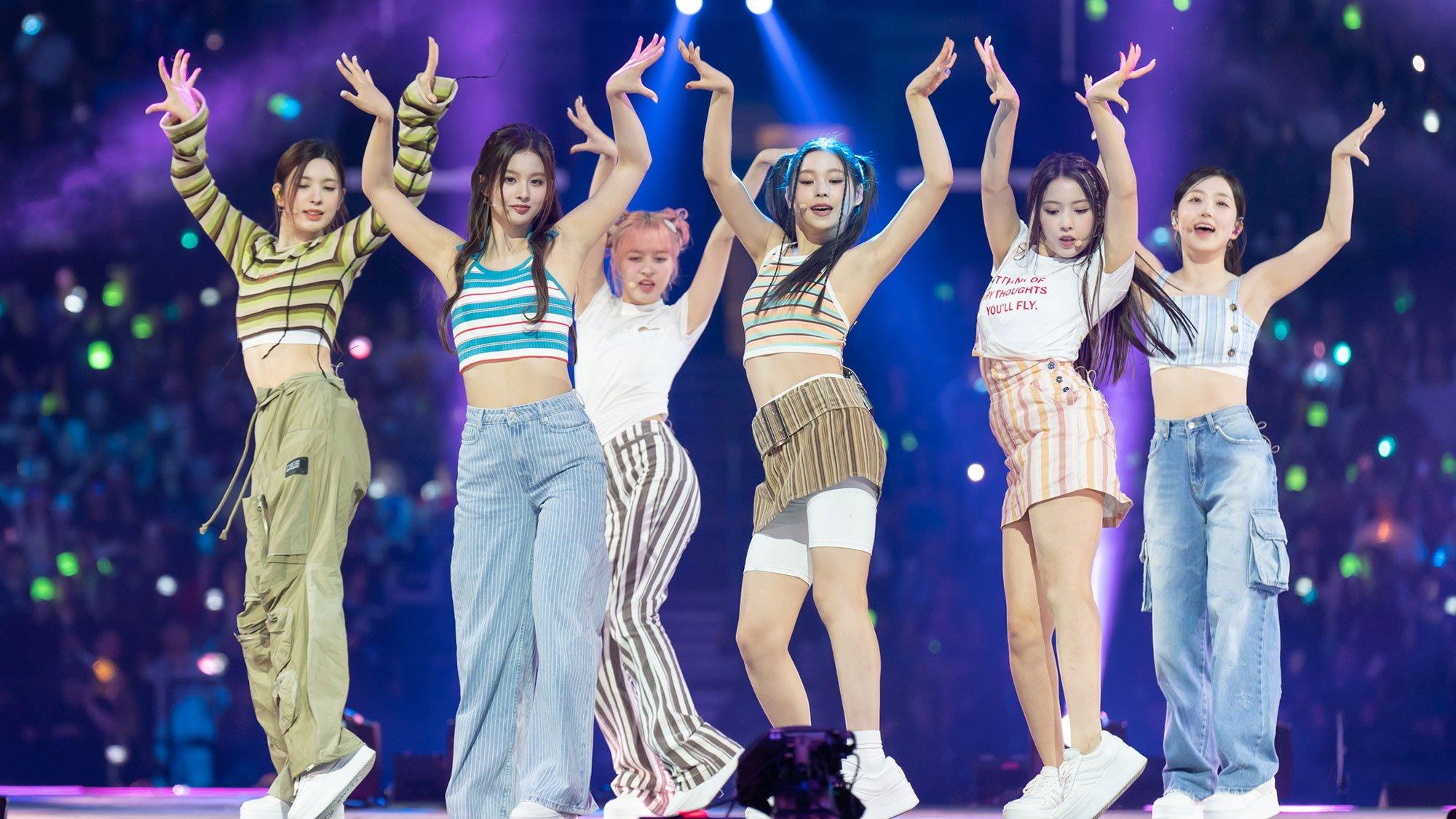
Photo: CJ ENM
list
KCON L.A. 2024 Returns: Get Ready With This Playlist Featuring NCT 127, Zerobaseone, ENHYPEN, Zico & More
The ultimate K-pop festival-convention returns to Los Angeles July 26-28, featuring a star-studded lineup with over 20 artists — including ENHYPEN, NCT 127, and Jeon Somi — interactive experiences, and unforgettable performances.
Ever since it first began in 2012, KCON has been a delightful surprise for attendees. Turn right on the convention floor, you might receive a goodie bag filled with high-quality skin care products. Turn left, and you could stumble into the first-ever performance of a K-pop group in the U.S. All this happens before the main concert even begins at night.
Returning to the L.A. Convention Center and Crypto.com arena from July 26-28, this year’s hybrid South Korean pop culture festival-convention event will host over 20 artists.
The line-up ranges from popular acts around like ENHYPEN and NCT 127 to '90s K-pop legends g.o.d and hip-hop icon Tiger JK (aka Drunken Tiger), plus burgeoning acts, including the newly formed seven-member girl group, IZNA, from the TV competition show I-LAND 2. KCON L.A. 2024 offers an array of musical exploration for anyone enraptured by the South Korean music scene.
Read more: 11 Rookie K-Pop Acts To Know In 2024: NCT Wish, RIIZE, Kiss Of Life & More
After days of meet-and-greets, showcase performances, and a special KCON Stage, each night of this year's KCON will culminate in a full-blown concert that will air in South Korea as part of the M Countdown music show.
Whether you’re a fan of soloists like Taemin, Zico or Bibi, girl groups like Kep1er and NMIXX, or boy bands like Zerobaseone and TWS, this KCON is undoubtedly for you. There are also surprises for anyone intrigued by changing entertainment technology, like Apoki, a virtual singer designed as a bunny from outer space.
While you may not (yet!) be a fan of all these artists, familiarize yourself with all that they have to offer with this playlist featuring some of their most popular and newest songs ahead of this year’s KCON L.A.
More K-Pop News
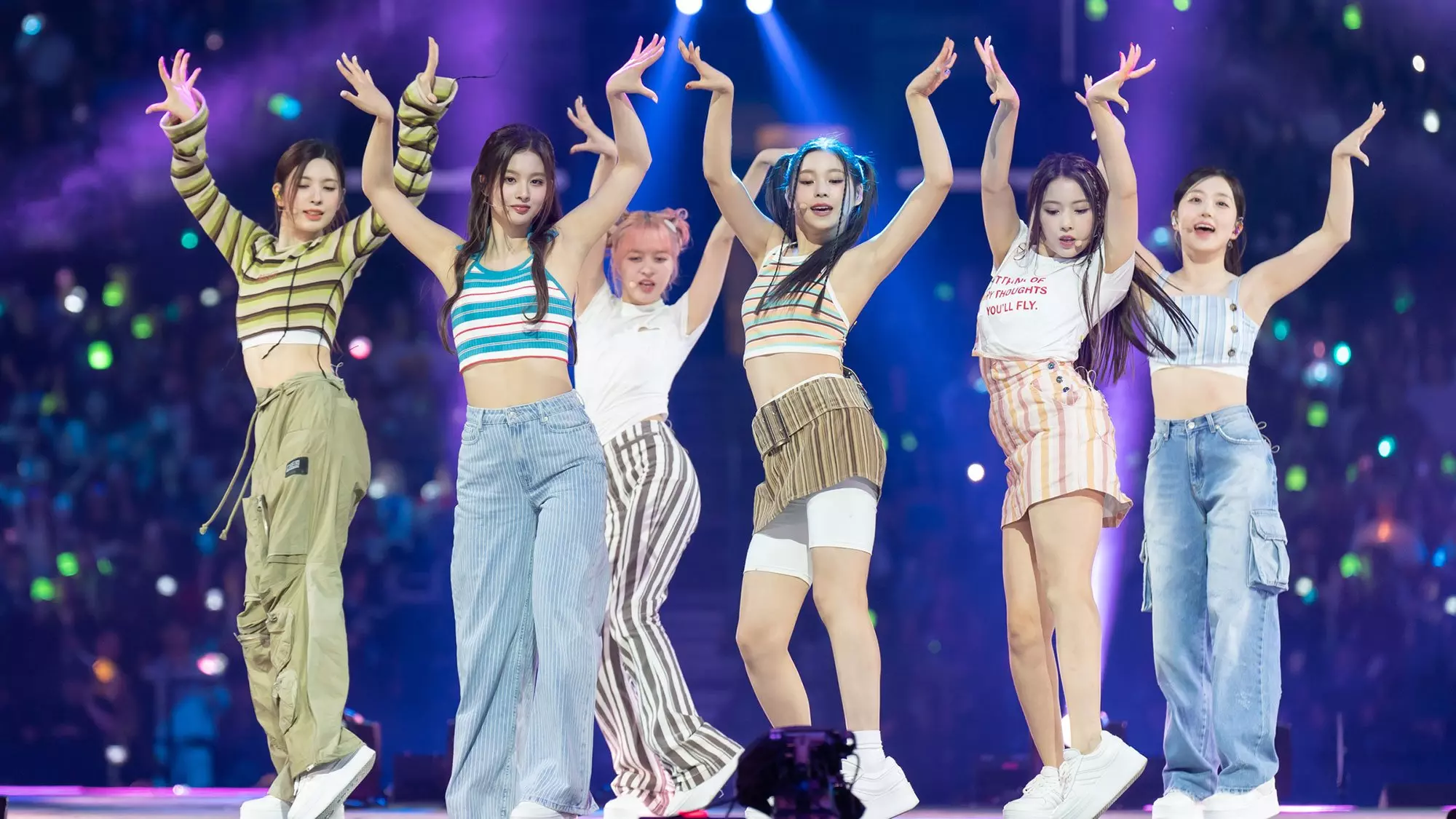
KCON L.A. 2024 Returns: Get Ready With This Playlist Featuring NCT 127, Zerobaseone, ENHYPEN, Zico & More
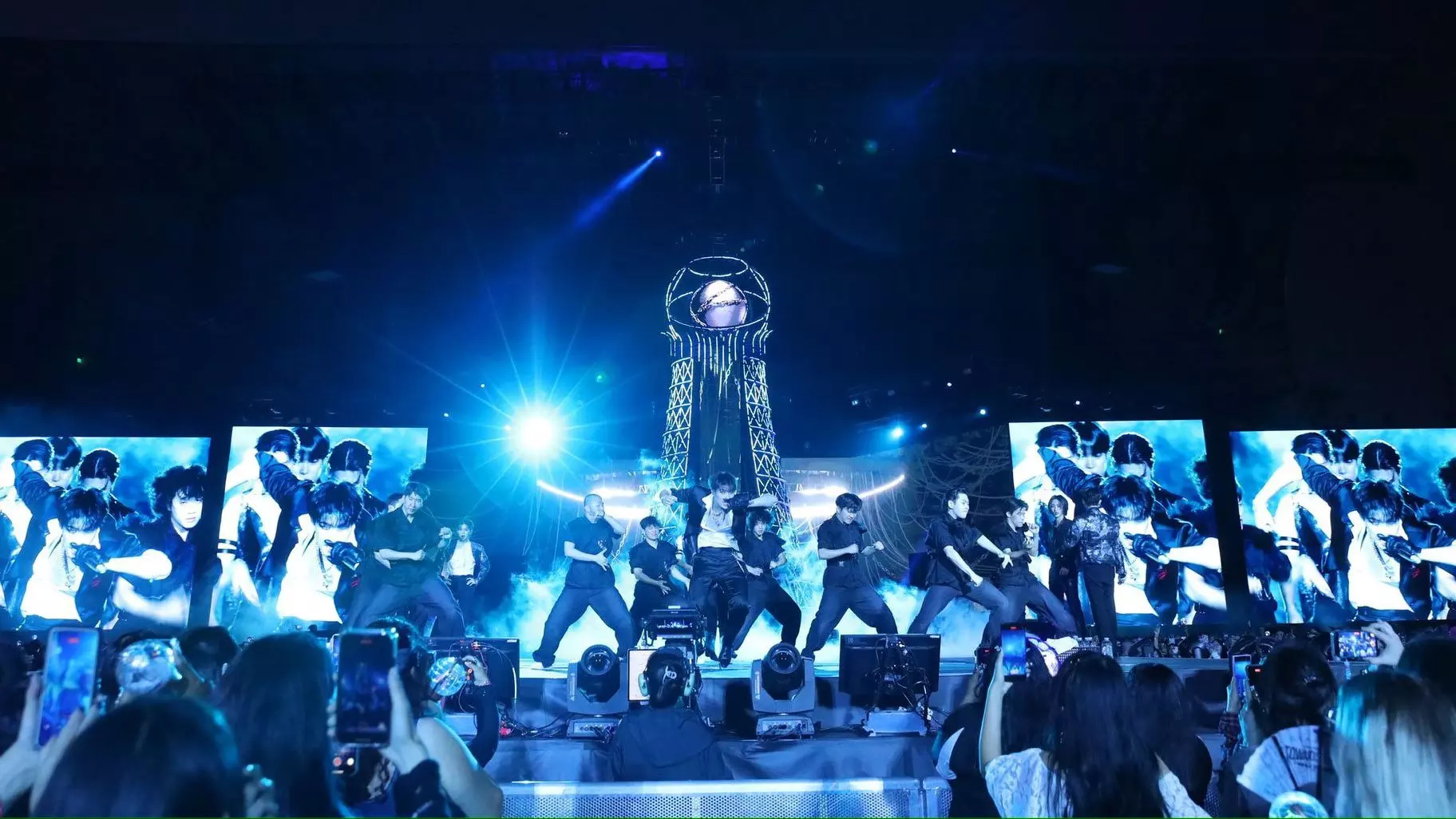
ATEEZ’s First U.S. Stadium Show Was A Triumph & Testament To Their Growth
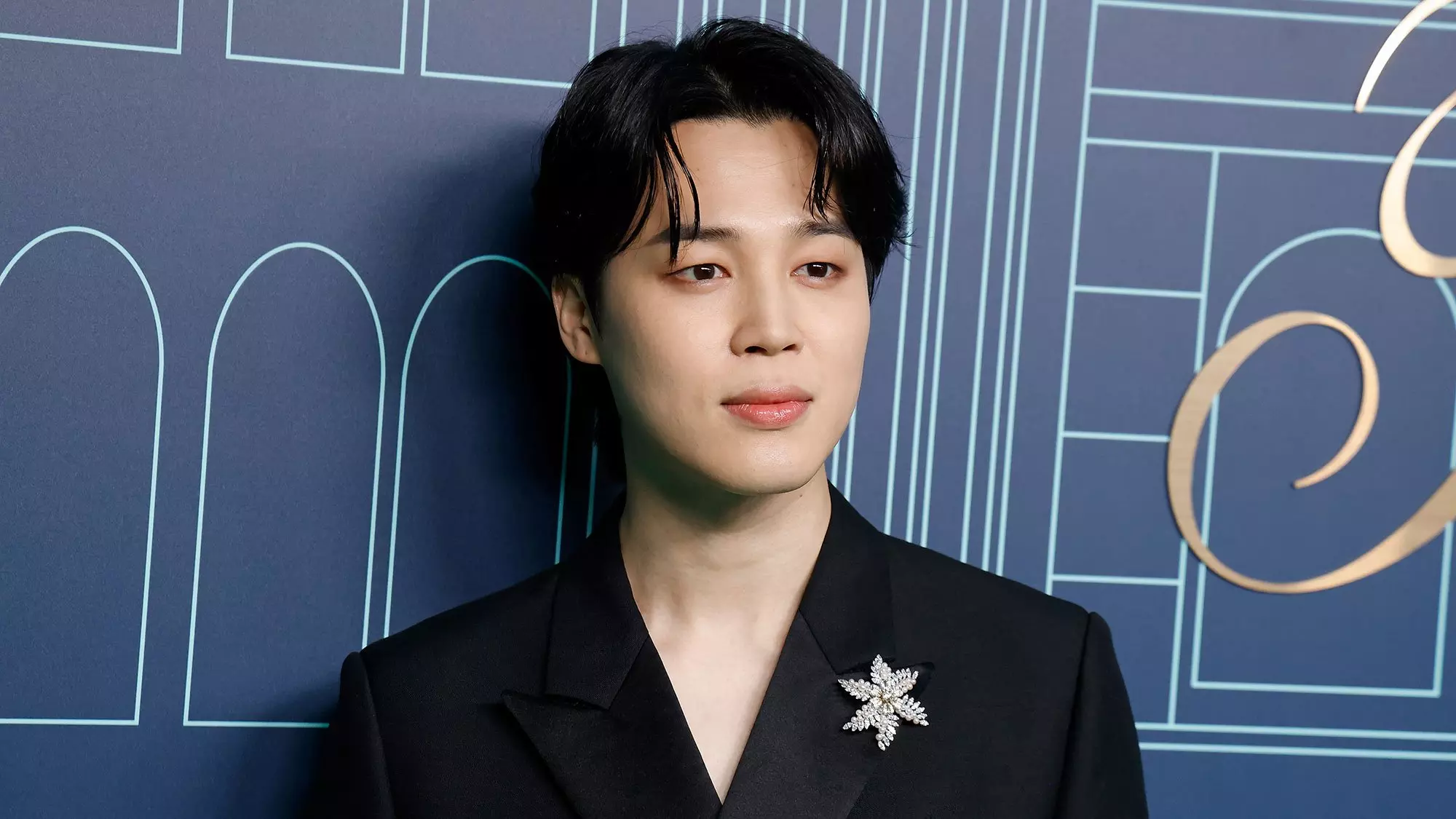
5 Takeaways from BTS Jimin's New Album, 'MUSE': A Bold Exploration Of Love And Inspiration

NCT 127 Essential Songs: 14 Tracks You Need To Know From The K-Pop Juggernauts

ENHYPEN And JVKE "Say Yes" To Cross-Cultural Collabs & Exploring New Genres
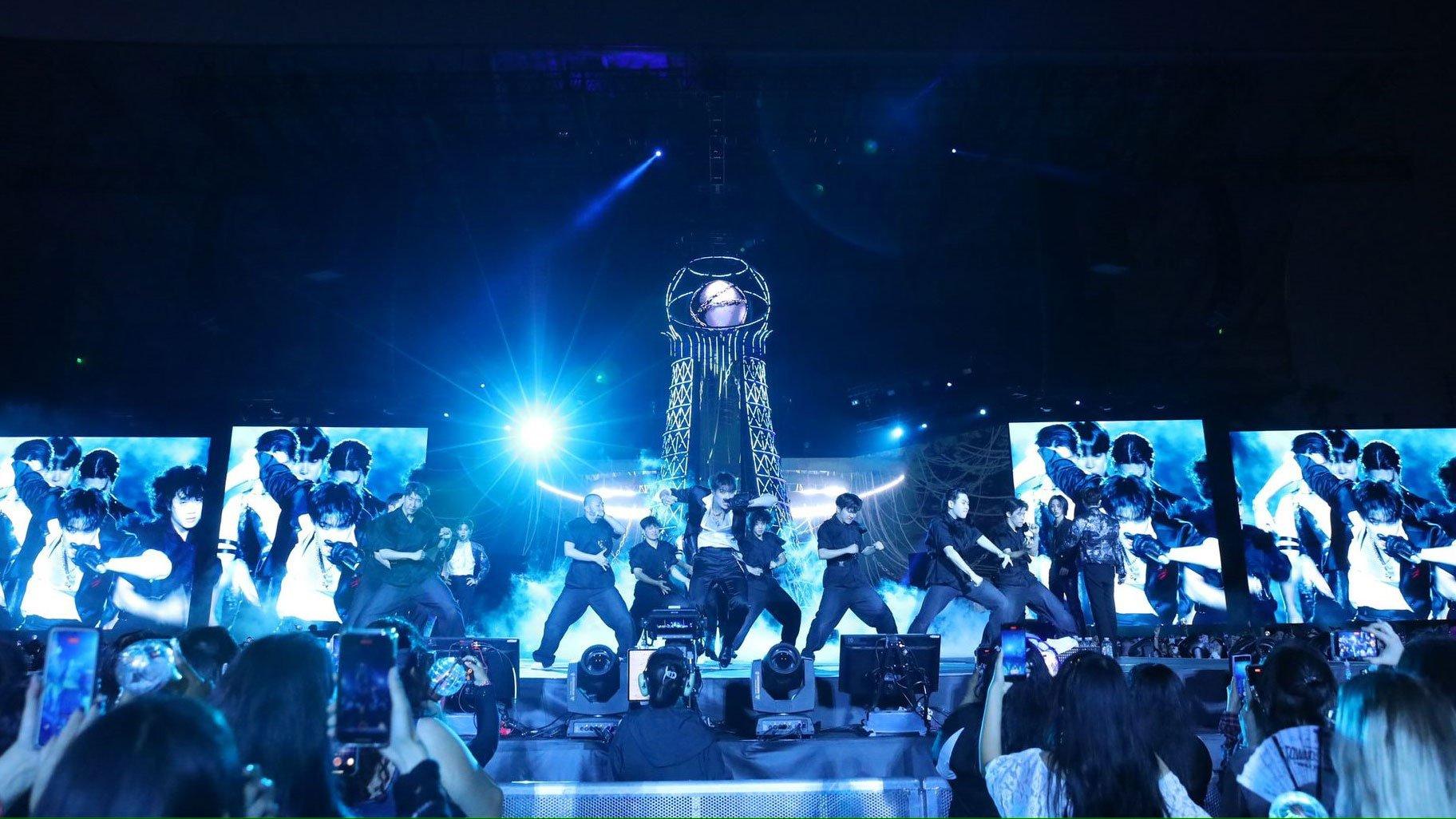
Photo: KQ Entertainment
news
ATEEZ’s First U.S. Stadium Show Was A Triumph & Testament To Their Growth
During two performances at L.A.'s BMO Stadium, the fast-rising K-pop boy group dazzled audiences with drama, dance, and a deep appreciation for how far they've come.
On July 20, K-pop boy group ATEEZ stepped foot onto one of their largest stages yet for their first U.S. stadium show. The scene at Los Angeles’ open-air BMO Stadium was a far cry from the group's L.A. performance in 2019 — their first tour stop ever — at the petite Globe Theater, a former movie palace with a tenth of BMO’s capacity.
Even then, as a five-month-old rookie group, fans (called ATINYs) saw a remarkable promise in Hongjoong, Seonghwa, Yunho, Yeosang, San, Mingi, Wooyoung, and Jongho. In the years since, ATEEZ has developed a growing presence in the States, even being the subject of a first-of-its-kind GRAMMY Museum pop-up. If the BMO Stadium performance was any indication, ATEEZ have officially hit their stride.
Read more: Inside The GRAMMY Museum's ATEEZ & Xikers Pop-Up: 5 Things We Learned
The nearly sold-out July 20 show felt like a level up, and not just because of the size of the venue. "As we performed, I really felt like ATEEZ has grown so much," singer Yunho said near the end of the night. He’s not wrong: they’re undoubtedly more confident than ever. Perhaps that’s because the octet made history earlier this year as the first K-pop boy group to perform at Coachella. Regardless, ATEEZ's growth in both production and showmanship was palpable.
If you missed ATEEZ’s two nights in L.A., don’t worry: K-pop’s resident pirate kings (more on that title later) have more up their billowy sleeves. In the spirit of their never-ending grind, the Towards the Light: Will to Power tour has nine more North American stops, including New York’s Citi Field. Read on to find out why you won’t want to miss these fast-rising K-pop idols.
The Members Are As Good Apart As Together
ATEEZ’s motto is "eight makes one team" for good reason. Individually, their talents and tastes are prismatic, yet complement each other perfectly — a fact that comes into startling clarity midway through the show, when the group breaks off into units and solos.
Equal parts erotic and controlled, trap banger "IT’S You" gives Yeosang, San, and Wooyoung room to deploy their enigmatic charms as a trio; ATEEZ’s purveyor of belted high notes, Jongho, dips into his deeper register on solo ballad "Everything"; diametric duo Hongjoong and Seonghwa spit fire about the rapport that arises from their differences on red-hot cypher "MATZ": "M-A-T-Z like allergy, we don’t really fit together / Yeah, yeah, but on stage, reacting to that synergy."
Then there’s the wistful "Youth" from dance class pals Yunho and Mingi. The two go way back — something they reminded audiences of by acting out a fictionalized version of a real phone call they shared the day before auditioning for KQ Entertainment. "Imagine us taking the stage together someday," Yunho said. "Sounds amazing, right?"
Read more: ATEEZ Are Here To Win The Hearts Of K-Pop Fans
ATEEZ Know How To Turn Up The Drama
ATEEZ's lore runs deep. In their conceptual universe, what began as a swashbuckling tale of pirates in search of treasure evolved into an anarchic manifesto about toppling the world order. Recently, in a Wild West turn, they’ve been masquerading as cowboys dedicated to the daily hustle.
Every ATEEZ performance has a story; on this tour, the theme is light. But, as always in ATEEZ’s oeuvre, that light can’t exist without a darkness seeking to quash it. The way they convey this narrative — acting, stage decoration, extras — is a masterclass in drama, fit for the theater as much as a stadium.
Watch: Global Spin: Watch Ateez Represent South Korea With Kinetic Performance Of "The Real"
They’re In Their Element Onstage
The success of ATEEZ’s storytelling is bolstered by the group’s unearthly stage presence. In that regard, Seonghwa led the pack, moving like a man possessed. Whether crawling on his knees, rolling his eyes back, or slinging a sword to symphonic backing, the lithe dancer never let the air-tight facade slip — except, of course, when it came time to offer a couple of warm words to fans.
Like Seonghwa, the rest are also shockingly versatile. San effortlessly switches between agile body rolls and thigh caresses in the dangerously sensual "Cyberpunk," then vigorously glides his arms through air at the climax of "Say My Name," a gesture that has only grown in power and potency over time.
ATINYs Do Their Best To Match ATEEZ’s Energy
"There [are] more than 20,000 singers in here," Hongjoong said as the lead-in to the soaring "Dance Like Butterfly Wings." "Can you show me your singing?"
Sing they did: All night, the crowd brought an energy as fierce and passionate as ATEEZ, especially when barking at charismatic rapper Mingi, much to his apparent enjoyment.
But the single noisiest moment came during "Guerilla." At a certain point, Yunho shouted a ferocious "Make some noise!" as a cue and ATINYs know it’s time to warm up their vocal chords; while Jongho belts some of his highest notes yet, fans roared "Break the wall!" at the top of their lungs, loud enough to rise above the stadium enclosure.
Fan chants and cheers are a mainstay of K-pop shows in South Korea, but due to differences in concert etiquette and language barriers, most don’t make their way overseas. ATEEZ and their fans broke that wall, and built a bridge in its place.
It’s A Full Circle Moment In Their Career
That ATEEZ chose to drop anchor in Los Angeles for their first U.S. stadium show feels especially momentous. The band has history in Southern California, having trained at L.A.-based dance studios Movement Lifestyle and Millenium Dance Center prior to their debut. ("Our second hometown!" San said during the show.)
"Even though it was six years ago, it feels like just yesterday," Hongjoong said in his encore speech. "It’s absolutely an honor to be right here, now, in such a big venue."
That’s a short time to come as far as they have, without slowing pace. "But, you know, it doesn’t stop," Hongjoong continued. "We will keep going to the next step and the next step, with you. Let’s keep making moments to shine even brighter, together." And if these three hours are any indication, ATEEZ has a light that won’t soon be dimmed.
More News About ATEEZ

ATEEZ’s First U.S. Stadium Show Was A Triumph & Testament To Their Growth
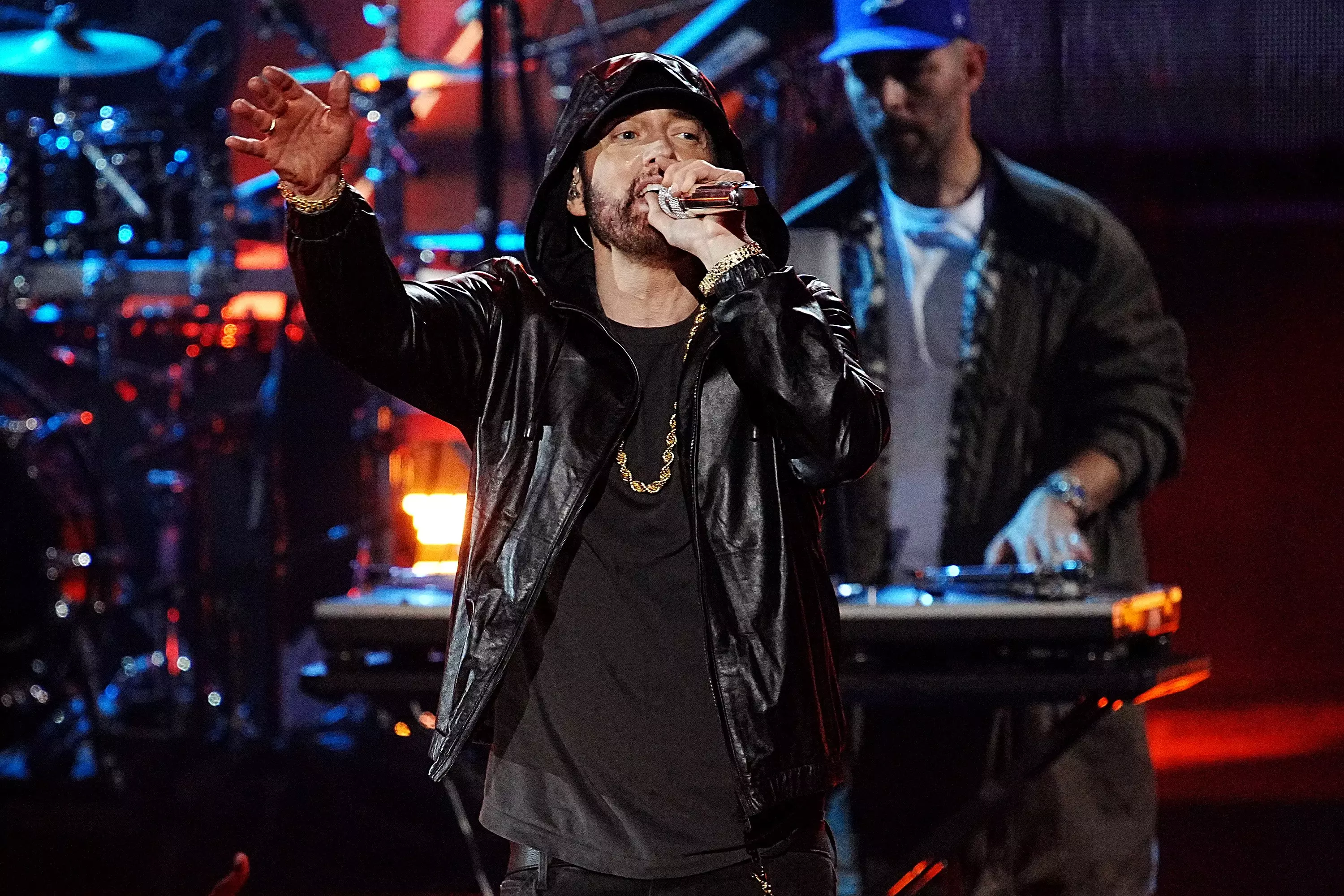
New Music Friday: Listen To New Albums & Songs From Eminem, Maya Hawke, ATEEZ & More
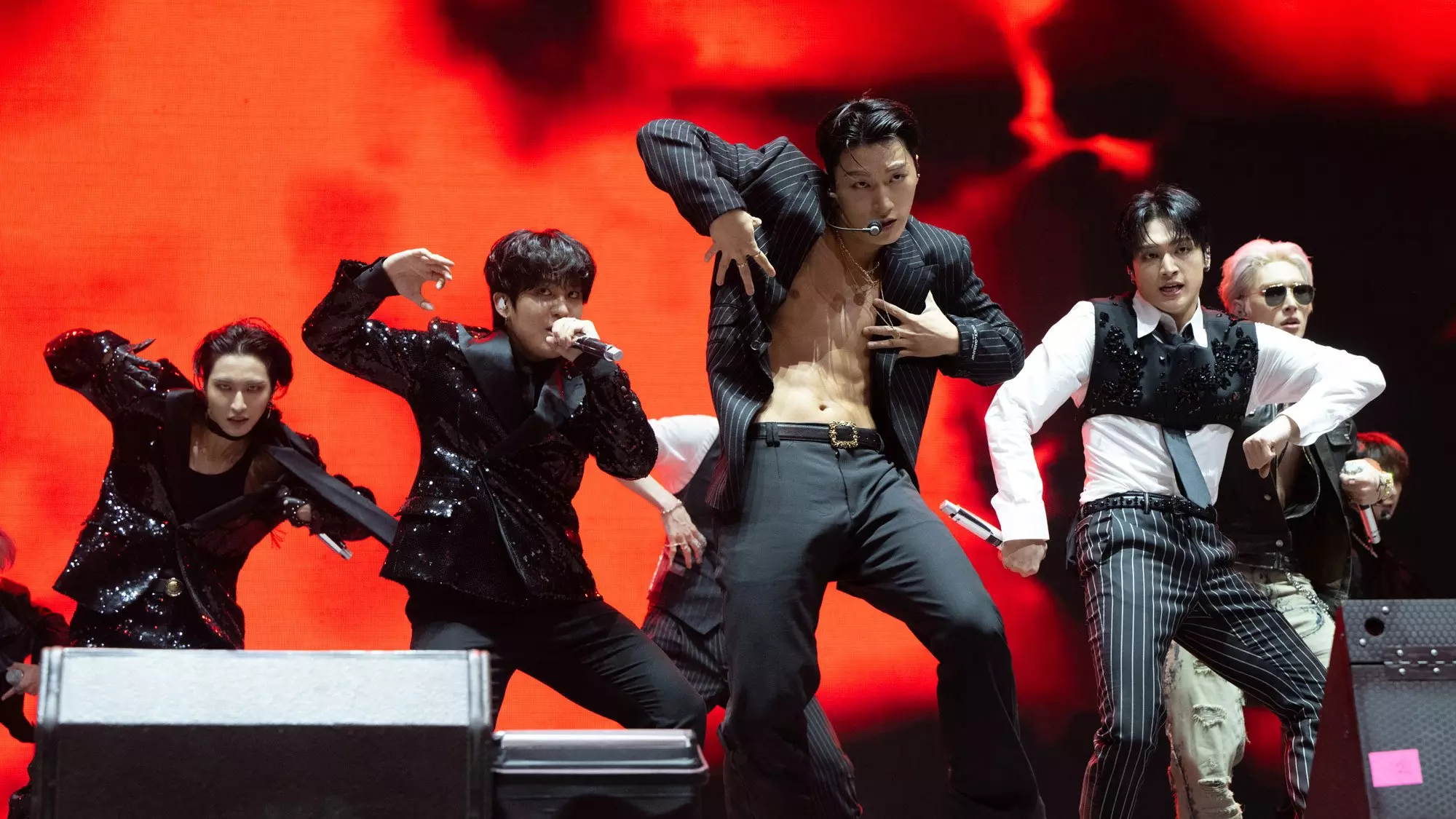
K-Pop Summer 2024 Guide: ATEEZ, IU, TXT & More Live In Concert & On Tour
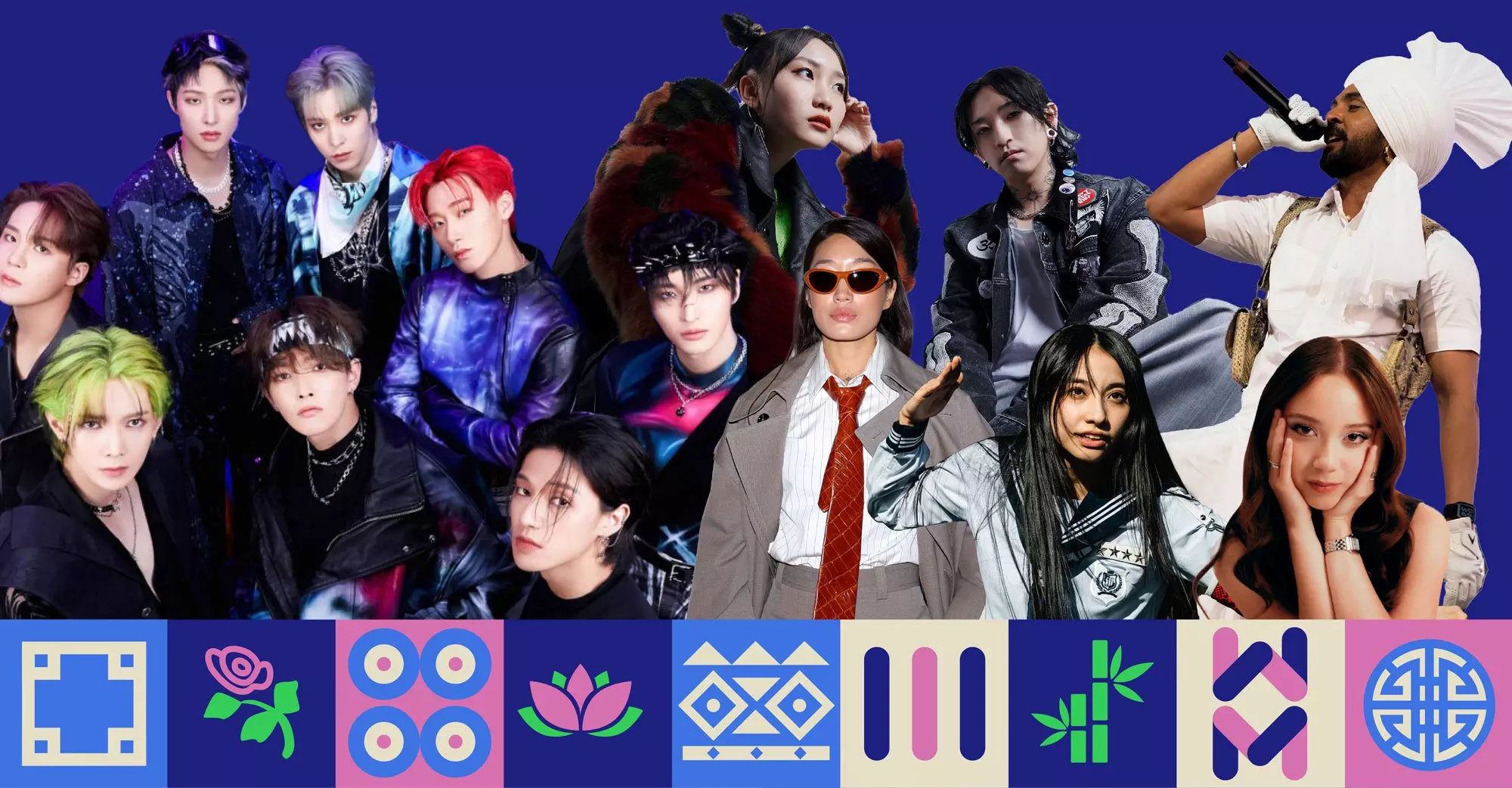
Leap Into AAPI Month 2024 With A Playlist Featuring Laufey, Diljit Dosanjh, & Peggy Gou
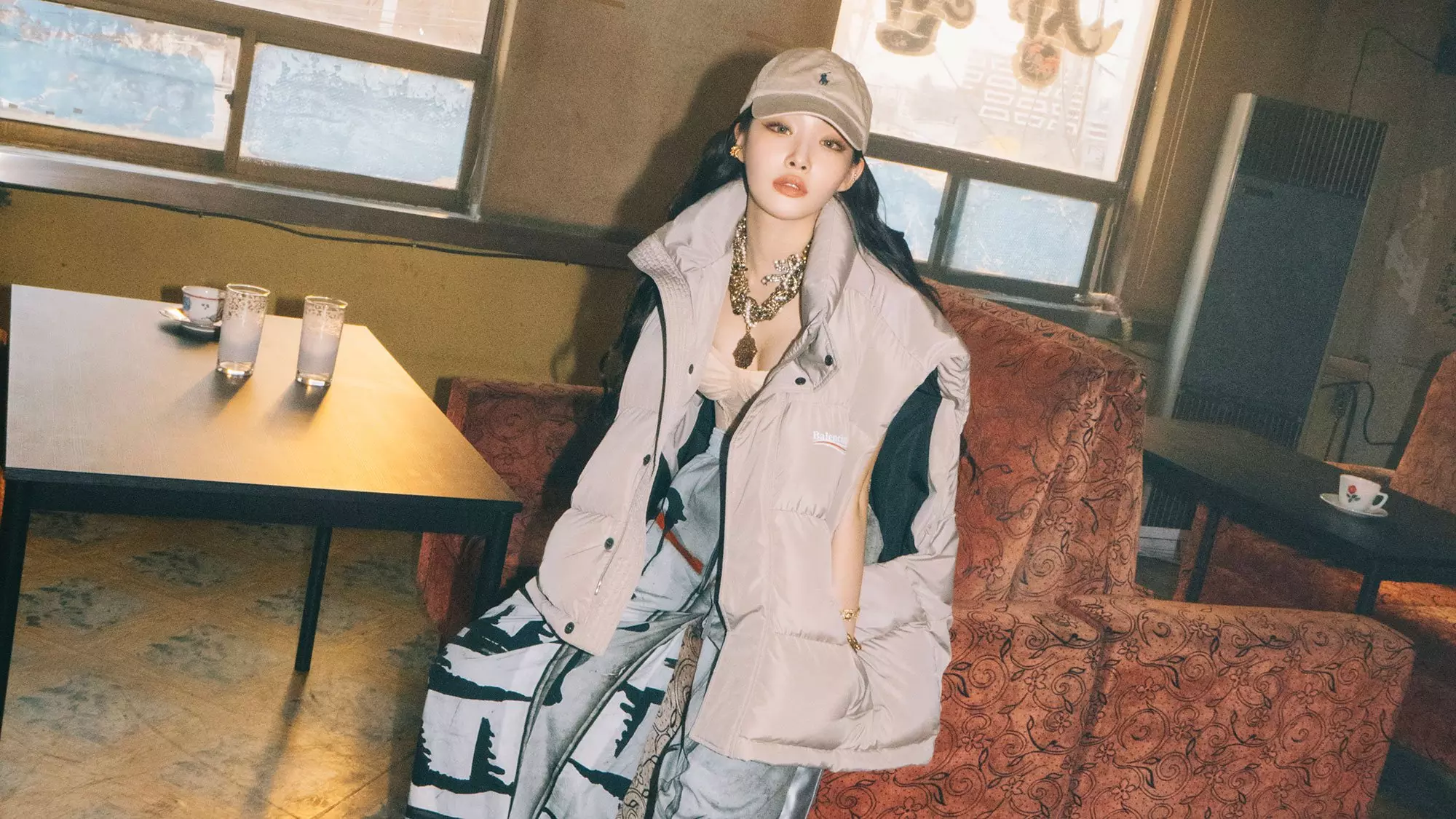
Chung Ha Returns: On 'EENIE MEENIE,' The K-Pop Soloist Is Ready To Step Back Into The Spotlight
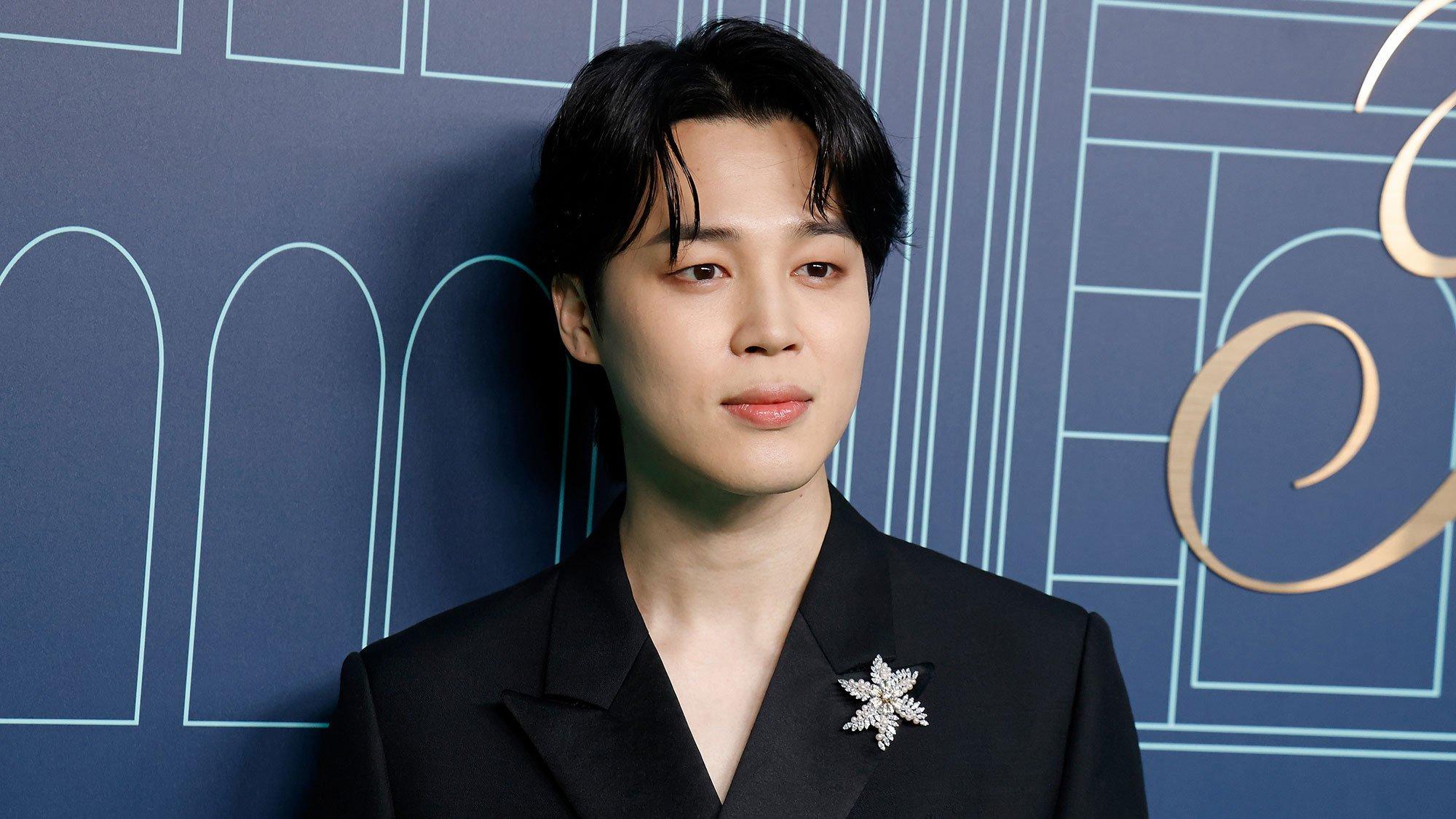
Photo: Taylor Hill/Getty Images
list
5 Takeaways from BTS Jimin's New Album, 'MUSE': A Bold Exploration Of Love And Inspiration
Jimin's second solo project, 'MUSE,' showcases his artistic growth and versatility, featuring a blend of nostalgic sounds, personal reflections, and standout collaborations.
K-pop juggernauts BTS are still on hiatus due to military enlistments, except for Jin, who was discharged last month. Yet, all members remain booked and busy in their solo endeavors.
Documentaries, travel shows, special singles — you name it, they carefully prepared it before starting their duties. And after new records from j-hope (HOPE on the Street) and RM (Right Place, Wrong Person) this year, the next in line is Jimin, who dropped MUSE today.
The album comes almost a year and a half after his debut EP, FACE, which placed Jimin as the first South Korean soloist to top Billboard's Hot 100 chart. In it, the Busan-born star proved his versatility and prowess standing on his own, captivating audiences old and new with his sensitive charisma.
In MUSE, Jimin introduces a new facet of his musical identity: bolder and more confident, but still a big softie at heart. To celebrate the beginning of a new era — and to ease the wait until his discharge next year — here are five key takeaways from Jimin's latest release, MUSE.
It's Another Jimin-Led Production
FACE was a proper introduction to Jimin's artistic vision, with him contributing to every aspect of the project and co-writing all of its tracks, minus the instrumental "Interlude: Dive."
Now, he takes it up a notch for MUSE, showcasing his growth by co-writing six out of seven tracks, and co-producing two of them: "Rebirth" and "Interlude: Showtime." Once again, Jimin had a hand on all of the album's components, including its concept and visuals, and bore down another layer of his ever-evolving skills.
If FACE introduced us to a vulnerable and sometimes desperate Jimin, MUSE charges forward with main pop boy energy, tender but commanding, sweet but sassy. It works both as a gift to fans and a tool to get to know Jimin even deeper.
He’s Still In Search Of His Muse
"We never met, but she's all I see at night/ Never met but she's always on my mind/ Wanna give her the world/ And so much more/ Who is my heart waiting for?" Jimin sings in MUSE's track, "Who." As the lyrics suggest, MUSE's main theme is Jimin's journey to find the source of his inspiration — his muse.
The album's seven tracks are all interconnected by love and longing, with Jimin searching for the one but getting lost in the way, and back at it once more. Through this perspective, he continues his path of self-discovery. After looking at his own FACE in the mirror, who else does he see? Who else instigates him enough to make art?
A Stellar Team Backs Up The Effort
To write and produce MUSE, Jimin enlisted longtime collaborators Pdogg, Ghstloop, Evan, and Supreme Boi. They have also been working with BTS for years, and know just what Jimin wants and needs in his songs.
But to make this album even more special, Jimin also collaborated with a fresh crop of professionals. Lead single "Who" was co-written and co-produced by Jon Bellion, Pete Nappi, and Tenroc, while Ayo the Producer and Kofo co-signed the fan-dedicated "Closer Than This." OneRepublic's Ryan Tedder helped pen "Be Mine," and Tommy Brown has writing credits on "Rebirth" and "Smeraldo Garden Marching Band (feat. Loco)."
Aside from Korean rapper Loco, MUSE also features American actress and singer Sofia Carson on the smooth duet "Slow Dance." Together, these names assembled a cohesive, yet diverse LP, brimming with influences from several decades, genres, and countries at once.
The Smeraldo Flower Makes A Comeback
Back in 2017, when BTS was in their LOVE YOURSELF era, they also introduced to their lore a fictional blue flower named Smeraldo. Symbolizing "a truth that cannot be told," its legend was better explored in the track "The Truth Untold (Feat. Steve Aoki)," and offered important clues to understanding that era's messages.
However, as years passed, the Smeraldo flower was largely forgotten from BTS's new works — until MUSE. Here, Jimin brings back the blue flower as one of the albums' visual concepts, and as the main motif behind pre-release "Smeraldo Garden Marching Band (feat. Loco)."
According to a press statement, the track's lyrics "express the longing to confess and find love on behalf of those unable to articulate their feelings," hence the use of Smeraldo. As for its curious title — loosely inspired by The Beatles' 1967 album Sgt. Pepper's Lonely Hearts Club Band — it came first as a casual nickname between Jimin, Pdogg, Ghstloop, and Evan while they worked together on FACE, and eventually became real.
It’s Packed With Nostalgia
If you miss Justin Timberlake's Justified sounds and other early-2000s gems, MUSE is here to take you on a nostalgic trip. Inspired by pop, R&B and hip hop from that era, Jimin gave his latest album a vintage, cozy veneer.
These references are predominantly visible on "Who" and its delightful guitar strums, but "Slow Dance (feat. Sofia Carson)," for example, sounds like an updated version of Usher and Alicia Key's "My Boo," and "Be Mine" could be the 2020's lovechild of Santana's "Maria Maria" and Sean Paul's "I'm Still In Love With You."
Another strain of references can be seen in "Smeraldo Garden Marching Band (feat. Loco)," which extends The Beatles' inspiration to experimental samples and marching band percussion, and creates a quirky piece that strays away from any current trends. "Interlude: Showtime" drinks from the same source, featuring a circus brass and drum line that introduces us to the singularity of "Smeraldo Garden."
While infused with nostalgia, MUSE still appeals to today's tastes, and offers a seamless, polished listen. It stands as a testament to Jimin's artistic growth, and while he might not have found his muse yet — he is certainly a source of inspiration for many.
More BTS News

5 Takeaways from BTS Jimin's New Album, 'MUSE': A Bold Exploration Of Love And Inspiration

GRAMMY Museum Partners With HYBE For New K-Pop Exhibit 'HYBE: We Believe In Music' Opening Aug. 2
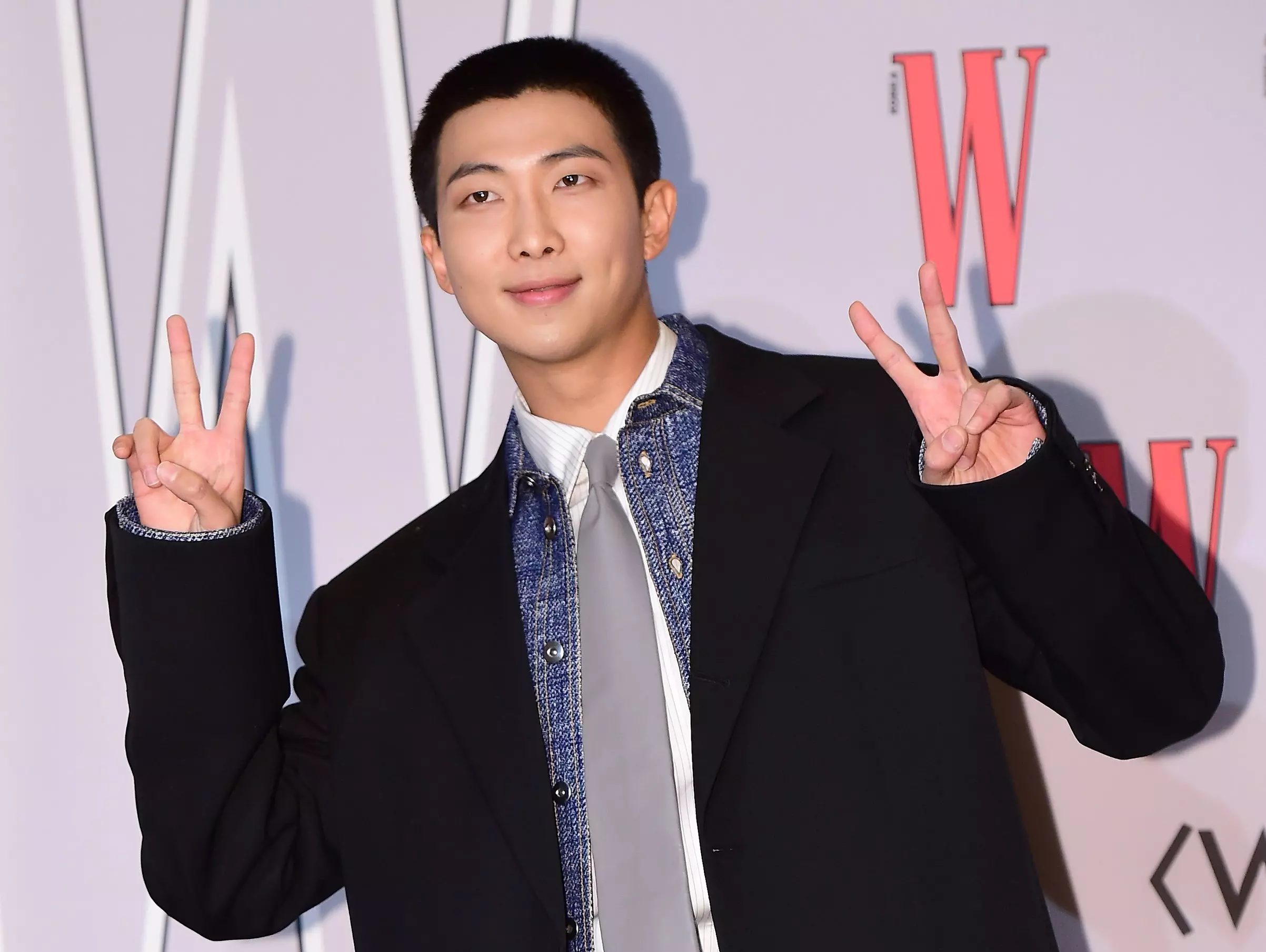
Stream RM's New Album 'Right Place, Wrong Person': See The Tracklist, "LOST!" Video & Special Guests
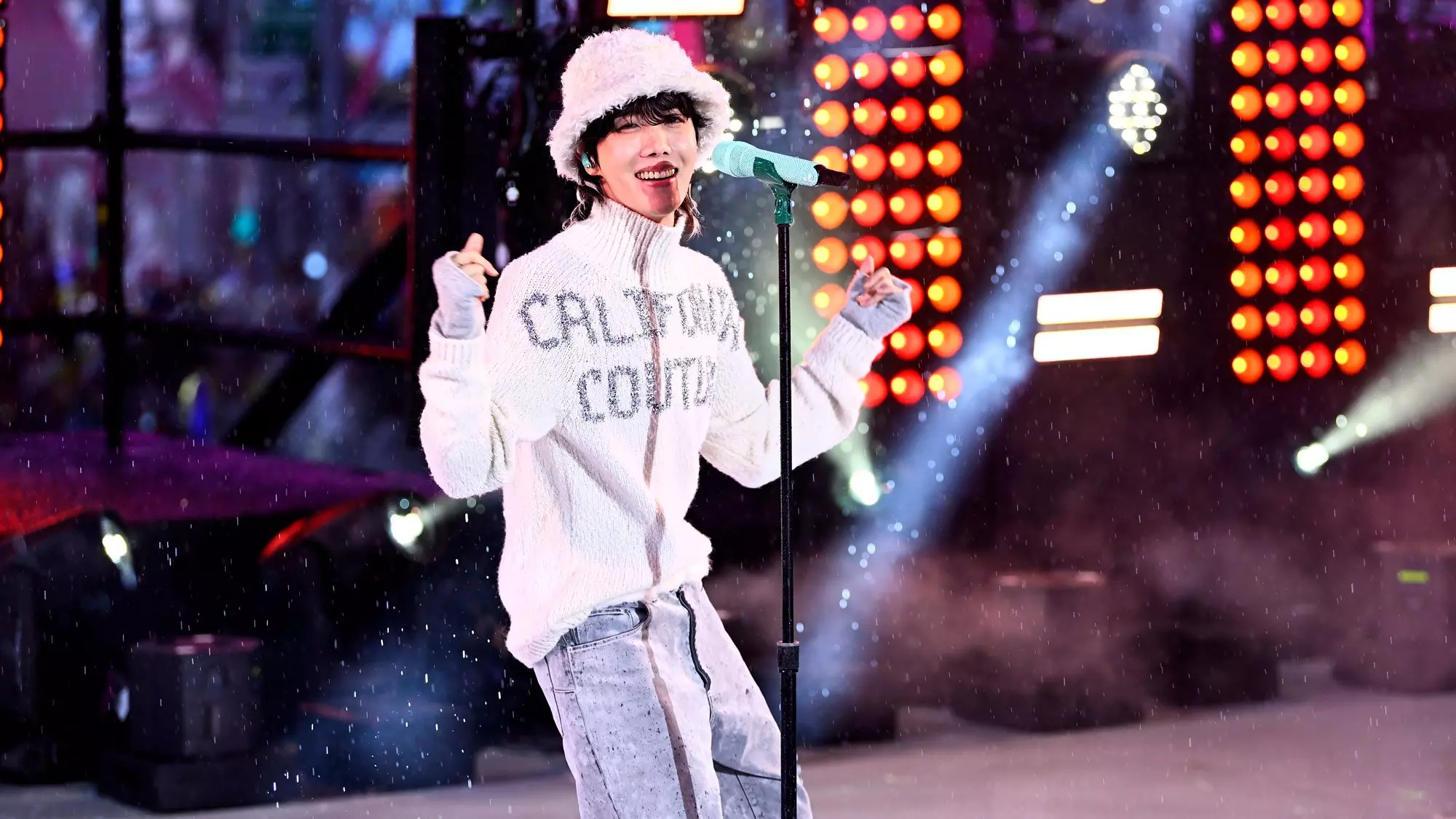
J-Hope's Road To 'Hope On The Street Vol.1,' From Falling Back In Love With Dance To Tying Together His Global Influences
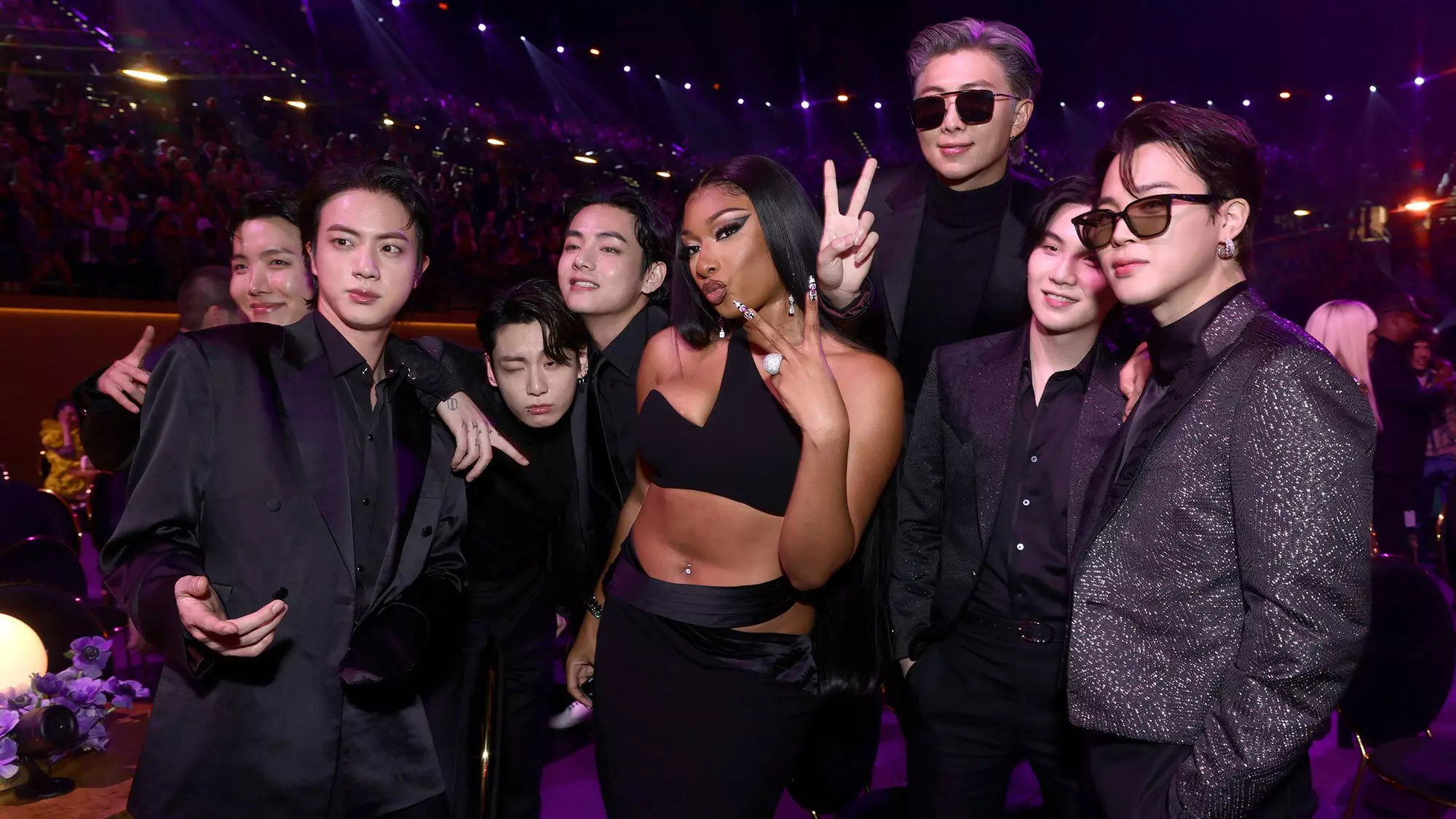
9 Essential K-Pop/Western Collabs: From BTS And Megan Thee Stallion, To IVE And Saweetie
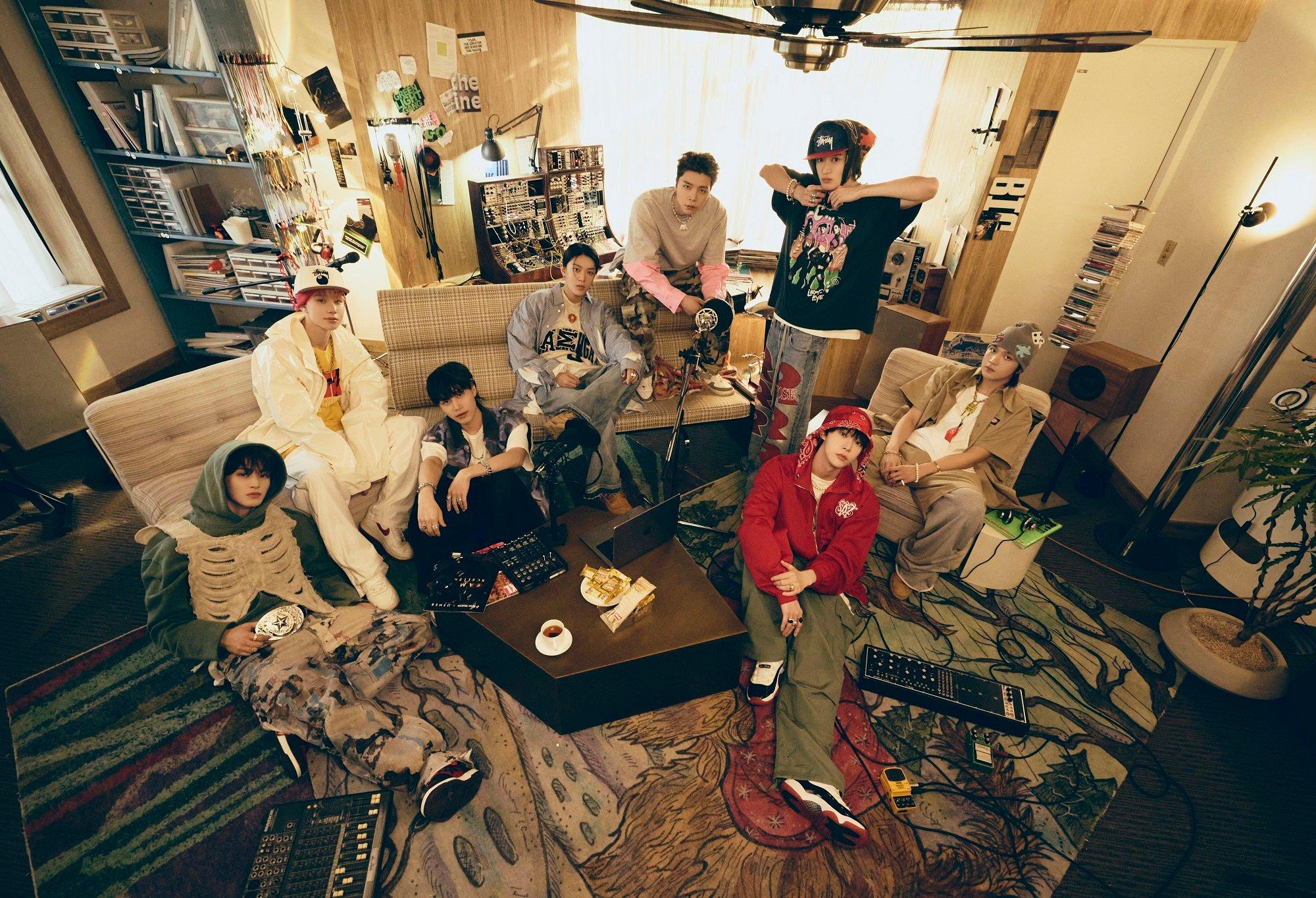
Photo courtesy of SM Entertainment
list
NCT 127 Essential Songs: 14 Tracks You Need To Know From The K-Pop Juggernauts
Eight years after their debut, NCT 127 have released their sixth studio album, 'WALK.' Before you dive in, press play on this chronological list of NCT 127 hits and deep cuts that show their musical ingenuity — from "Highway to Heaven" to "Pricey."
In the K-pop industry, the Neo Culture Technology juggernaut stands out as a cosmopolitan universe. The project is characterized by its highly experimental approach, where each of NCT's subgroups contribute a unique twist.
This is especially true of NCT 127. Comprised of Taeyong, Taeil, Jaehyun, Johnny, Yuta, Doyoung, Jungwoo, Mark, and Haechan, NCT 127's identity was forged via innovative arrangements that defy convention.
During their rookie days, this ahead-of-its-time strategy felt polarizing and raised a few eyebrows. However, after some years of ambivalence (and with some lineup changes in between), they exploded in popularity during the early pandemic with their second studio album, NCT #127: Neo Zone. This record gave them their first title as million sellers, significantly increasing their listeners globally — many of whom embraced the group's music as an escape during quarantine.
Read more: Breaking Down The NCT System, From The Rotational NCT U To The Upcoming NCT Tokyo
Today, they are more influential than ever and their sound is more accepted in the ever-expanding scope of K-pop. Nonetheless, some K-pop listeners tend to pigeonhole the group as "noise," despite having a diverse catalog and some of the best vocalists of their generation.
Nearly coinciding with their eighth anniversary, NCT 127 released their sixth studio album, WALK on July 15. To mark this occasion, GRAMMY.com presents a song list — in chronological order — demonstrating their musical geniality, which extends far beyond the public's usual perception.
"Switch"
The group's first mini-album, NCT #127, laid the foundations of their audacious sound and paired it with vocal finesse. To wit, the lead single "Fire Truck" arrived as an unapologetic disruptor shaking up the K-pop industry.
But the bookends of the EP are uniquely contrasting. Whereas "Fire Truck" opens with bold posturing, the outlier "Switch" concludes the ride with a more lighthearted and youthful production. In a way, this song could also be considered a prelude to the NCT universe, as it was recorded a year before NCT 127's debut, and it features members of other NCT iterations — like WayV and Dream — when they were still trainees.
"Limitless"
The name of this track is a statement of the group's boundary-pushing ethos. True to form, the song is built over a hammering backbone and lengthy synths that bite. The chorus is the highlight; its dynamic explosion of vocals only intensifies the momentum. And while the Korean version is strong, it could be argued that the Japanese rendition imbues the song with new layers of depth that truly elevate it.
It’s worth mentioning that, during the Limitless era, Doyoung and Johnny were added to the lineup, marking NCT 127’s first release with nine members — a move consistent with the original (now-defunct) concept of the NCT system.
"Sun & Moon"
Some songs are crafted for faraway souls and to offer solace to the aching heart. That's why "Sun and Moon," an evocative B-side from NCT 127's third extended play, exists as an unmissable gem.
It's a lyrical tale of longing, where Taeil, Doyoung, Johnny, Taeyong, Jaehyun, and Yuta serenade a distant love, hoping the gap will shrink and a reunion will come. The arrangement is understated but dream-like, and when the pre-chorus arrives, the most beautiful lines are unveiled: "When my moon rises/ Your sun rises as well/ Under the same sky/ In this different time/ Our hearts are connected/ Under the same sky."
"Come Back"
Co-created by GRAMMY-nominated producer Mike Daley and multi-instrumentalist Mitchell Owens, "Come Back" exemplifies maximalism, undulating between intensity and elegance.
"One of the standout aspects of this song is the creative use of chops throughout the track," Daley tells GRAMMY.com. "Even though the arrangement follows a pretty standard structure for us, these chops add a unique flavor that sets 'Come Back' apart. We got to be more experimental [for this track] and bring in some unusual elements."
The voices of Taeil and Doyoung prominently take center stage, infusing potency that ensures smooth progressions throughout the production.
"Lips"
Featured on the group's first Japanese studio album, Awaken, "Lips" is an unjustly overlooked cut that blends sensuality with hypnotizing Latin rhythms. The deeper you are immersed in it, the more enchanting it becomes, casting a spell over your mind.
Its minimalist formula is effective, and the lyrics hint at a compelling journey: "Your lips come and take me to the place to go/ The place you would know where you should go." Sometimes, less is more, and the impact can be equally powerful.
"Highway to Heaven"
"Highway to Heaven" shines as one of the crown jewels in NCT 127's discography, praised not only for its cathartic production but also for marking a turnaround in their artistry. It sees them delving into more subdued and ethereal soundworlds.
A pre-release single from their fourth mini album, We Are Superhuman, the instrumental is woven with buzzy percussion and silken guitar strings. The group's vocal prowess truly exhilarates, crescendoing a declaration of freedom during the chorus: "We'll take the highway to heaven/ Any time, anywhere I feel you/ You and I, highway to heaven/ This place where we're together is heaven."
The track reaches its pinnacle with an interlude guided by Jungwoo's velvety delivery, eventually setting the stage for Haechan's soaring voice.
"Superhuman"
"Superhuman," the lead single from We Are Superhuman, is a timeless masterpiece. The avant garde song showcases the group's expansive adaptability, exchanging their usual edge for intricate sophistication.
American singer/songwriter Adrian Mckinnon — a frequent collaborator of SM Entertainment, home of the NCT project — teamed up with South Korean producers TAK and 1Take to bring the song to life, and he recalls being "blown away" when he listened to the instrumental. "All the glitches and stutters immediately gave nostalgia," Mckinnon tells GRAMMY.com, noting the sound choices reminded him of old school video games. "[The song] kind of sits in its own lane, maybe somewhere between glitch funk and glitch hop. Maybe a little Daft Punky too?"
Mckinnon says he sat with the instrumental track for half an hour before recording his vocal ideas. "I wanted to absorb it in its entirety before trying anything."
He also explains that they created the song without a specific group in mind, so he was excited to discover the song was placed with NCT 127. "I think this speaks to the versatile nature of the group because they executed the track very well and were able to make it their own. It's easily one of my favorite songs I've been a part of."
"Love Me Now"
Another piece from Daley and Owens, "Love Me Now" pulses with gentleness and heartwarming nostalgia. It's a song made for those days when everything feels right in place.
Daley recalled working on "Love Me Now" during a K-pop songwriting camp in Seoul, and says he refined an existing track. "Most of our stuff is tailor-made for artists in Korea, but this track was very much a U.S. pop/dance radio-sounding track," he says. "It doesn't feature a ton of sections, switch-ups, or the musically intricate bridge that a lot of our K-pop songs normally have. It's very minimalistic, bright, and centered, and sometimes that's all you need."
He observes the creation process of "Love Me Now" was more straightforward than "Come Back," as the latter contains the usual elaborateness of K-pop productions. "That simplicity in ['Love Me Now'] lent itself to making a very catchy, memorable record that was easy to digest."
"NonStop"
By NCT standards, "NonStop" — from the repackaged album NCT #127 Neo Zone: The Final Round — is a B-side that overflows with the potential of a lead single. It's an amalgam of unburdened rap verses and cohesive vocals that glide effortlessly across a cutting-edge production.
Adrian Mckinnon explains that he and Kenzie chose the track from a selection created by the British production duo LDN Noise due to the magnetic pull of the intro. "The arpeggiated tones and the crazy melody of the lead synth immediately took us to the future," he says. "The chord progression and the rising energy out of the pre-chorus — it all felt like some high-speed race through some futuristic city."
The development of the structure proved quite challenging, but the end result encapsulated the intended concept. "Listening to it in its final form, you would think the sections were obvious, but each of the melody and topline — including others that didn't make the song — all felt quite hooky," McKinnon shares. "But since you only have so much 'song,' you must pick your favorite bits and massage the ideas together. That's how we arrived at what 'NonStop' came to be."
"First Love"
A burgeoning romance transforms into the dulcet melodies that define "First Love," a B-side from NCT 127's second Japanese EP, Loveholic, released in February 2021. Excitement beams throughout the lines of the song, capturing the world of possibilities that come with finding the person you've always dreamed of.
When the group leans towards professing love in all its shapes, they do so with a rawness that percolates through their voices, easily perceptible to all. And here, they opt for a playful and tender side.
"Breakfast"
Off of their third full-length album, Sticker, "Breakfast" is distinguished by its harmonic richness and stunning vocal arrangements.\
The track emerged from a collaboration in which Swedish producer Simon Petrén devised the sonic framework, complemented by GRAMMY-winning songwriter Ninos Hanna and songwriter/producer Andreas Öberg. "As the melody ideas evolved, the song was also developed and built up to match the topline," Öberg tells GRAMMY.com. "The original demo was called 'Breakfast' and tailor-made for [the group]. SM Entertainment decided to release this song with them shortly after we submitted it."
Öberg describes the composition as "an interesting hybrid," with the original demo molded to be "a modern dance/house record while still using advanced chord progressions not only with influences from jazz and fusion."
He also cites Michael Jackson as an inspiration, drawing from "his unique style of switching between minor and major tonalities."
"Favorite (Vampire)"
After releasing Sticker, NCT 127 wasted no time and quickly followed up with a repackaged album centered around the hauntingly resonant "Favorite." A brainchild of Kenzie, American producer Rodney "Darkchild" Jerkins, and singer/songwriter Rodnae "Chikk" Bell, this record is the most tempered of all the NCT 127's title tracks.
A whistling sample introduces a thumping trap beat that rapidly unfolds into piercing lines — courtesy of Taeyong and Mark — that slice through the song. But as we hit the road toward the chorus, "Favorite" veers into a more vocally-driven approach, a splendid transition that balances its core. In classic SM style, the bridge is a triumph, with Doyoung, Taeil, and Haechan pouring their hearts out as if they've been shattered into a hundred pieces.
"Angel Eyes"
Listening to "Angel Eyes," a cut nestled in the middle of their most recent release, Fact Check, is akin to a healing escape. From the first seconds, pure bliss fills the air and quickly transforms into an open invitation to lose ourselves in the music.
"Paradise, like an angel fly/ With your wings, make me fly through the brilliant world/ My delight in all the days and nights/ Even in darkness, make me dream the greatest dream," they sing in the last chorus, prescribing optimism atop a layering reminiscent of the '80s.
"Pricey"
One of WALK's B-sides, "Pricey" boasts a delightful instrumental with thick basslines and a fusion of piano and guitar chords. Although the rapped chorus momentarily threatens to stall the pace, vibrant ad-libs — growing more captivating as the song progresses — quickly pick it back up, perfectly aligning the overall effort with their unique sound.
"Pricey" was originally intended for the American market, which makes it all the more inexplicable that it was tucked away in the NCT 127 vault for so long. Thankfully, it's now receiving the spotlight it deserves – it's simply too remarkable to remain unearthed.
More K-Pop News

KCON L.A. 2024 Returns: Get Ready With This Playlist Featuring NCT 127, Zerobaseone, ENHYPEN, Zico & More

ATEEZ’s First U.S. Stadium Show Was A Triumph & Testament To Their Growth

5 Takeaways from BTS Jimin's New Album, 'MUSE': A Bold Exploration Of Love And Inspiration

NCT 127 Essential Songs: 14 Tracks You Need To Know From The K-Pop Juggernauts

ENHYPEN And JVKE "Say Yes" To Cross-Cultural Collabs & Exploring New Genres
